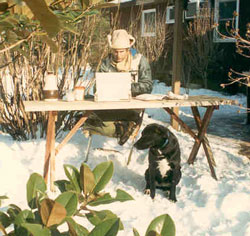Interview With David Drake
 One thing I learned while attending the World Fantasy Convention in Calgary this October was that I wasn’t nearly as well read in the genre as I thought. One person I didn’t know of and hadn’t read before going to the con was David Drake, however, by the time I left I was a fan — and I hadn’t read a word he’d written yet.
One thing I learned while attending the World Fantasy Convention in Calgary this October was that I wasn’t nearly as well read in the genre as I thought. One person I didn’t know of and hadn’t read before going to the con was David Drake, however, by the time I left I was a fan — and I hadn’t read a word he’d written yet.
It started with a panel. The panel was meant to address the question ‘Is fantasy an inherently violent genre?’. I didn’t actually care about the issue, to be honest, I was going to listen to another man I’d become a fan of (without reading any of his work or seeing a single one of the movies made from his books), David Morrell. As it turns out only David Morrell and David Drake showed up, the other half of the panel were MIA.
Mr. Morrell and Mr. Drake quickly dealt with the panel question (the answer, it turns out, is no btw 😉 ) and began to have a discussion. They talked about war, combat, conditioning…so many things. It was a profound experience for me, listening to them, and I was not alone, everyone I spoke to about that panel agreed.
Later I made a point of going to listen to Mr. Drake read from his latest work-in-progress. I loved the fact he was reading from a marked-up draft of his work. When I came home I ordered The Complete Hammer’s Slammers Volume 1from Amazon. However, as you can tell, I was a fan before I ever read a word.
You can imagine how pleased I was then, when David agreed to answer a few questions for Niteblade.
Or maybe you can’t.
I came to your work very late, I’m afraid, but I’m trying to make up for lost time. I’ve just about finished “The Complete Hammer’s Slammers Volume 1” and even though I don’t usually read military sci-fi, I’m really enjoying it. One of my favorite aspects of these stories is that there are never clear-cut good guys or bad guys and very rarely a happy ending for anyone. Was that a conscious choice on your part or just the natural result of writing about war?
I don’t preach. That is, I was telling stories. In the situations I wrote about in my Military SF (which I’ll abbreviate MSF from here on out), people were making hard decisions and frequently trying very hard to kill other people, but they didn’t hate the people they were fighting. They didn’t know anything about them except the blur in their sight picture.
When I was in Viet Nam in 1970, we mostly ran into NVA because the VC had been pretty well destroyed in Tet of ’68. I didn’t hate them, but I won’t pretend I had any positive feelings about them.
A few years ago I read the novelized memoir of an NVA veteran (The Sorrow of War by Bao Ninh). For the first time I had a feeling of what it was like to have us as the enemy. The troops were worse treated by their government than we were by ours, and the survivors were ostracized in a much more brutal fashion by the civilians they returned to. Mind, there weren’t many survivors: the author was, typically, the only man of his 500-man battalion who came back.
Knowing our similarity wouldn’t have made any difference in 1970, to me or him either one. We both had a job to do.
In the afterward of “The Complete Hammer’s Slammers Volume 1” you talk about following the truth of your vision and in conclusion you say “And I don’t believe any writer can have real success unless he follows his own truth.“. A lot of aspiring writers read this blog, so I ask on their behalf, how do you learn to recognize your truth? How did you recognize yours?
I guess the short answer is: if you change something you’ve written because ‘it’ll never sell if I tell what really would happen,’ then you’ve identified your own truth. (And are planning to lie instead, of course.)
But in all honesty, I never thought of it that way. I didn’t realize that the early Hammer stories were unpalatable when I wrote them. I didn’t even realize that after they failed to sell for a year and a half. It was only on cool reflection (which, trust me, I wasn’t doing much of in 1973) that people were really appalled at being shown what had been our daily reality in Viet Nam.
The other thing is, however: if I’d written ordinary adventure stories as I started out doing, I’d be completely forgotten today. The reason the Hammer stories have been continuously in print for so long is that I really did tell the (my) truth.
I’ve only just begun reading “Lord of the Isles” which I understand is the first in a trilogy of trilogies called the Isles Series. Is that right? Can you tell us a little bit about the series?
There are nine books in the Isles series, right. There’s an arc, but you should be able to pick up any of the first six and read it without losing much of anything. I reintroduce the main characters in action in each.
The last three are a true trilogy: that is, elements are introduced in The Fortress of Glass, which are amplified in The Mirror of Worlds, and resolved (with a bang, if I may say so) in The Gods Return. But you really can read even those three alone or out of order. It works a lot better if they’re consecutive, though.
Remember that I wrote only short fiction for the first 12 years since I started selling. I couldn’t assume anybody who read (say) the October, 1976, issue of Galaxy would have already read the October, 1974, issue. Likewise with books in a store.
Basically, the Isles series is a Tolkienesque fantasy where the background is the Mediterranean Region during Classical times rather Northern Europe during the Middle Ages (my background as opposed to Tolkien’s). The four viewpoint characters are struggling to unite the human world against Evil which is just as fragmented as the forces of Good are, but which is generally inhuman.
I didn’t want a lot of scenes of tens of thousands of people slaughtering tens of thousands of other people. I’ve written that sort of story and I may do so again–but in the fantasies, the opponents can be demons or lichs or very large insects. I prefer that.
Hmm. I would’ve preferred that in 1970 too. Here I have the option.
The last book in the series, “The Gods Return” was recently released, can you tell us a little bit about it?
Gods wraps up the series, but more important it wraps up the final trilogy. I would hate for people to read the first seven books and be so horrified by one of the scenes in Fortress that they stopped there. (And I fear that may have happened.) There was a lot of ‘How could you do that?’ from readers.
Before I turned in the seventh book, I heard my editor on a panel say that, ‘This trilogy may not be the end of the series.’ I told him he was wrong: there’s no way to continue the Isles in any similar fashion beyond the end of Gods. This is a real climax/conclusion.
But I leave everybody (and their world) in a better place than any of them have been before.
How does it feel to finish the series off? Do you think you’re going to miss it?
A friend asked me if I felt relief when Gods came out. I realized I hadn’t thought (much) about the book in a year. I’d written a space opera and started an entirely new fantasy series since I shipped Gods off.
I’ve written a lot of books. I like most of them, and I like the Isles series a great deal. But I’m looking ahead, not back.
You say that writing heroic fantasy is good for your soul, why do you think that is? Is that why the WIP I was lucky enough to hear you read at WFC is fantasy-based?
I don’t want to write only fantasy, but switching from one genre to another (currently, from fantasy to space opera and back again) keeps me fresh and excited about what I’m doing. I did two of the Isles series back to back, and it felt like I’d been shoving a very big boulder uphill by the time I’d finished. I swore I’d never do that again–and I haven’t.
But changing off this way means that The Gods Return is just as fresh and fun to write as Lord of the Isles was back in 1995. (And boy, isn’t that a remarkably long time ago!)
One thing I’ve got to ask, why do you do all your writing outside?
Ah. Well, a variety of reasons. I haven’t driven a car since 1986 either (and that was to carry Larry Niven to the airport with his luggage); I get places on a motorcycle if I’m on my own. I just like having wide visibility.
I have wrens and finches land on me, sometimes. I get pooped on by hummingbirds. I watch frogs stalk and devour webworms (and stalk a skink, before getting a very unpleasant surprise when it tried to devour said poisonous reptile).
Think of me as being One with Nature. And okay, I’m weird. But I’m weird in a good way. (That one, at least.)
I think ‘normal’ is greatly overrated, so here’s to being weird in a good way 🙂 Thank you very much for answering my questions.
If you’d like to find out more about David Drake and the books he’s written (far too many for me to list here), you can check him out on the web at http://www.david-drake.com . On a related note, David talks a bit more about truth (and commercialism) in his most recent newsletter @ http://david-drake.com/newsarchive/news48.html
Enjoy. 🙂
Mr. Drake is about the only arthur whose work ever help get me out from a bad place.